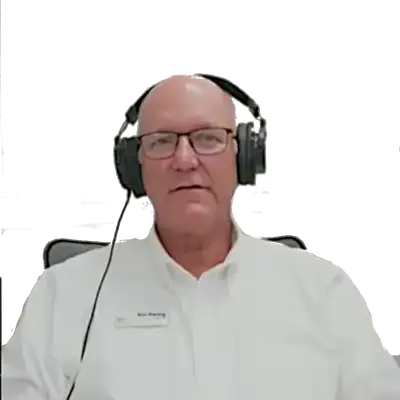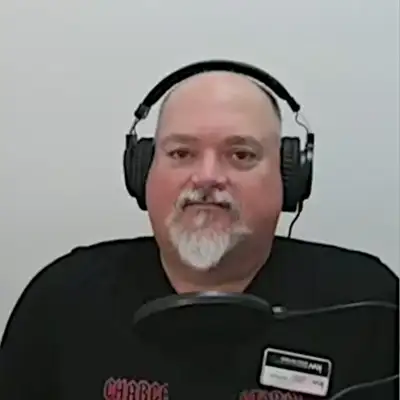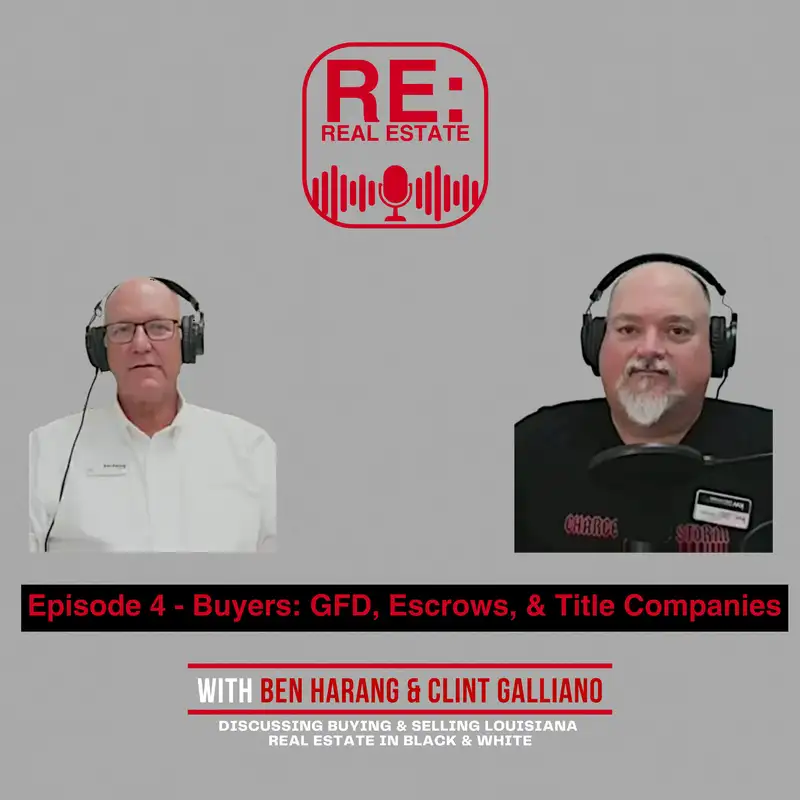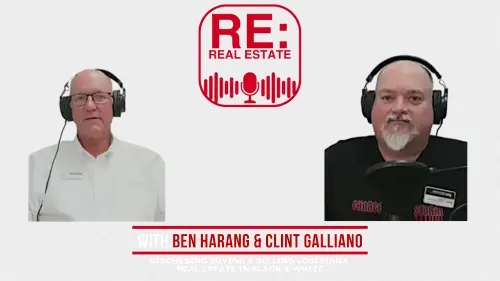Episode 4: Buyers-GFD, Escrow, & Title Companies
Ben & Clint (00:30)
Today's topic, we're going to be talking about title companies, real estate attorneys, and what's the difference between a good faith deposit and earnest money. Hello, Clint. How are you today? Hey, Ben, How you doing? I'm doing terrific. How you doing? I'm wonderful. Good. Topic.
Near and dear to my heart that a lot of people I don't think understand is the difference between a good faith deposit and an escrow deposit. In Louisiana, we typically have a good faith deposit, which means that you are want to buy the property in good faith. You're serious about it and you're serious enough to sit down and write a check the old fashioned way for
an agreed upon amount, $500,000, $2,500, whatever the situation dictates a warrants. And there are contingencies within the purchase agreement that if you do not buy that house, you get that good faith deposit money returned to you in specific situations, such as the house does not pass your subjective inspection.
The house needs to satisfy you and only you. If we can't get the house to satisfy you, you void the agreement and get your money back. If the house does not appraise for the agreed upon sales price and we cannot work out a new sales price, you get the money back. If you cannot get a loan that you legitimately tried to get and applied for within the timelines of the purchase agreement, you would get your money back.
There's also a provision about leases. The leases have to be acceptable to you. We typically don't have those in single family residential houses, but you have that in commercial and multi-family residential. So the leases would have to be satisfactory to you or you get the money back. In the case of an escrow deposit, which I really don't have any experience with because we don't use them in Louisiana typically.
is you write a check for your escrow deposit and whether or not, not whether or not, whether you actually buy the property or not, that money's gone. If you buy the property, it's applied to the sales price. If you do not apply the property, that goes, if you do not buy the property, the escrow money goes to the seller. So in my mind, you write an escrow.
deposit check on only on something that you're absolutely certain you will proceed and close on. So that's my explanation of escrow versus good faith deposit.
Yeah, that's pretty much the same explanation I have. Up until a couple of months ago, would say, you know, earnest money and good faith deposit is similar but different. And we use good faith deposit in Louisiana. And then in a Facebook group, saw an agent posting about how, was it an agent? No, it might have been an investor.
posting about how, I was an agent, correct myself, how when they submit an offer, they have to provide earnest money in this situation. It was $3,000 earnest money check. And if the seller doesn't accept the offer, that money's gone anyways. And it's like, there's the difference. That's crazy to me that you're going to pay somebody
to review an offer you're making on, making to them. That's, in my mind, that's crazy, but people can do business however they want to do business. Yeah. And I mean, I may be missing some details. I don't claim to know the laws and practices of other states and how they practice real estate, but that's the gist that I got from the comments on that situation.
Let's clarify that we are located in Louisiana. We practice real estate in Louisiana and real estate is specific to 50 different states. So the way we do it in Louisiana is not necessarily how somebody does it in Wisconsin or South Carolina. Plus DC and Puerto Rico. That's true. That's true. So we have more than 50. We have 50 states plus the territories and US possession.
It is at least state specific. In terms that mean something to us, the same terms don't necessarily mean the same thing in other states. So it's kind of like the Wild Wild West, really. And if somebody's telling you something should be done a certain way, but they're in a different state, then...
unless they are licensed as a real estate agent in Louisiana or salesperson in Louisiana, they don't know. Right. title companies. All right. You want to take it or you want me to? I'll start it off. Title companies.
I do a little bit of investing. I try and keep up with conversations and commentary on investing. And a lot of other areas, they use the title company to do everything. And we have title companies in Louisiana, but for the most part, everything is done through real estate attorneys.
real estate attorneys typically tend to own the title companies and handle the transactions. They do title research. They provide title insurance. They're a conduit for it. And, you know, so basically it serves the same purpose. They close the transactions. They make sure that the title is saleable and generally help us.
get transactions done. But a key thing is that if it's a finance transaction, that real estate attorney or title company, they don't work for the real estate agents, they don't work for the buyer, they don't work for the seller, they work for the lender.
Does that sound? You are absolutely 100 % right. Typically, well, the attorneys and the title companies work for whoever pays them. the buyer pays the title company for services that are ordered by the lender. So the lender is actually paying
the title company or closing attorney with the buyer's money, but the lender is paying them. The closing attorney or title company represents the lender to confirm that the title is insurable. There's generally flaws in every title, but if it's insurable, it's considered good title. So,
That's why the lender hires the attorney to protect themselves from a bad title in the case of foreclosure, because all they're interested in in the property is covering the mortgage with collateral. So it always feels like the attorney works for everybody in the room, but they are specifically either working for the lender or generally the buyer if it's a cash deal.
and the buyer would pay them directly. So it depends how the deal is structured and who's involved on who exactly the title company works for.
Yeah, cash deals are kind of neat if they work out right. I've worked with a client that they decided to buy a house that was in need of repair with cash. And we submitted the accepted contract to a local attorney who owns a title company.
And the next morning they called and asked when the buyer wanted to close. And the buyer was on their way back home, which involved a trek across the nine states to return home. And they needed to turn around and go to find a local branch of their bank to get the money to come and close the next day.
They got a good night's sleep before they turned around and came back. Yeah. You know, because sometimes it's that easy. I suspect that secession had just been completed on the property and they had everything they needed to ensure that it was clear title and easily insurable. Other times you run into situations that, like I mentioned in one of our other discussions where
There's all kinds of stuff hidden in the woodwork. When you get into family property that's passed down and passed down and passed down, and you may have five, six generations of family with no secessions done, know, four or 500 heirs, then that gets murky. That gets undoable. Right. And some titles can only be cleaned up by...
an act of partition, which is actually a civil lawsuit to get it cleaned up if there's people involved without successions done and orderly distribution of their share of the title. So it does get convoluted at times.
Yeah, that's some fun stuff to deal with. We kind of alluded to that stuff earlier. Yeah, it's always interesting. But fun is not the word I would use. It's interesting. I say fun facetiously Right, right. It's a warped sense of humor sometimes. Yeah, that's us. Uh-huh. That's why we got together to do this podcast. That's right. And Clint didn't introduce us when we...
When he came on, I'm Ben Harang I'm a realtor with Keller Williams Realty Bayou Partners in Houma/Thibodaux Louisiana. And Clint C. Galliano is a realtor with Keller Williams Realty Bayou Partners. So we, we worked together. We good friends and we had the idea of doing the podcast and here we are with some.
A little bit of new equipment later, not much, and a little bit of Clint's know-how, and we actually are able to record something that seems to be a decent quality that I hope people find interesting and enjoy.
Yeah. And our goal here is to provide information to people. We know there's a lot of, "well, I thought this" and "I thought that", or "this is how I think things should be". And ultimately we're here to bring you the facts. Our goal is to inform you to the best of our ability.
because we figured a better informed public is a better informed person. And we talked about this in the buyer's agent podcast we did, but the best way to buy property, buy a house is find a realtor that you trust, that you're comfortable with, that listens to you, that's reactive to you.
You and realtor should be on the same page of what you're actually looking for. They should listen to you. You should listen to them with their advice and expertise. And that generally works out into finding a house relatively quickly, getting through the inspection and appraisal process, and getting to a closing, as opposed to just trying to call the number on a sign.
try to develop relationship with five or 10 different agents that you never really develop a relationship with. And you think you have five or 10 agents working for you and you really have nobody working for you. anyway, enough of that. That's how the system is designed and it works well.
All right. Anything else we need to cover pertaining to this topic? Well, we talked about earnest money and escrow. We talked about closing attorneys, title companies. Yep. And we did cover both title companies and real estate attorneys. I think that's what we talked about on this one. And we've been on about 15 minutes. our timeline is 15 to 20 minutes. So I think we're there. So we're probably good.
Okay. And just a kind of a little PSA. This is just a conversation between Ben and I for y'all information. So we may stumble, we may stutter. We're not going to cut that out, because this is just a natural conversation between us. We don't write a script. We're not studying lines and memorizing them.
so that there may be some hiccups, you're going to see them you're going to hear them. Yeah. We, don't be shocked if you run across that. Yeah, we're going to record them, but we, we're not going to clean them up and polish them, to movie quality. Hopefully the video and the audio are a good quality, but it's, it's literally two guys with experience sitting around and talking about a given topic for the day we talk about it. And hopefully you see some value in there. you.
have any questions, we're going to have a comment chat opened up. We still trying to figure out exactly how that's going to work, how it works on on the recorded stuff. But, you know, we're learning to do this together. And we just thought it'd be a good idea to talk about what is what could probably be your biggest investment of your lifetime and buying a house or selling a house or
being involved in a real estate transaction, which is not something people do every day and Clint and I do it regularly. So we might be able to share some insight and save you some grief in the process. if you have any questions, feel free to contact Clint and myself and talk about it and we'll see if one of us can help you and see where it goes.
All right. I think we're good, All right. Another one in the can, Clint. All right. There we go. And right before Halloween. and by the way, well, too late for this year because you're not going to see this until later, but next year look for Bayou Blue Dancing Lights during the Halloween season and the Christmas season. It's an animated light show set to music.
Just drive by and tune your radio and your car to the radio station and you'll hear the music and see the lights moving to the music. And that's something that Clint does at his house. That's phenomenal. In Bayou Blue, if you have kids or grown ups with kids hearts, go take a look. It's interesting stuff. It's something that I wouldn't spend the time on, but when it's lit up, it sure looks good. I just know what kind of work it is to put it on.
The public thanks you Clint.
All right. All right. I'm Clint. All right. I'm Ben. Y'all have a good day. We're signing off. Bye bye.
Creators and Guests



